October 1918
Bulgaria, Austria & Turkey Surrender; Germany Stands Alone
October 3
Bulgarian Surrenders To Allies
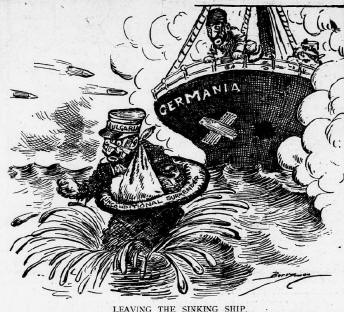 On Monday, Bulgaria surrendered and has agreed to evacuate all territory she now occupies in Greece and Serbia, to demobilize her Army immediately and surrender all means of transport to the Allies. Bulgaria also cedes control of navigation on the
Danube and free passage of Allied troops through Bulgaria for the development of military operations. All Bulgarian arms and ammunition are to be stored under control of the Allies.
On Monday, Bulgaria surrendered and has agreed to evacuate all territory she now occupies in Greece and Serbia, to demobilize her Army immediately and surrender all means of transport to the Allies. Bulgaria also cedes control of navigation on the
Danube and free passage of Allied troops through Bulgaria for the development of military operations. All Bulgarian arms and ammunition are to be stored under control of the Allies.
The Bulgarian Army is believed to have the backing of the people and the sentiment of the country is for peace; a peace to be obtained only by separation from the Central Powers. Indeed, the thought of the Bulgarians is believed to have gone further than merely leaving the alliance with Germany and Austria-Hungary, but in
actuality joining the Allies.
Allies Continue Their Push On Western Front
In the last ten days the Western battlefront has seen great changes as the Allies have forced their way through the Hindenburg line. The Germans now are retreating towards the line they held in 1917.
Given fairly good weather, some big changes on the western front may be seen before winter. Under the attacks of the British and French troops, 50 miles of the Hindenburg defense system has been overrun. In the north, the valuable network of railroads in Flanders is rapidly becoming useless, and in the south the French are
pressing vigorously west and north of the Rheims.
American regiments fighting in the Hindenburg line have seen some of the hardest fighting of the war. They fought day and night in groups and single-handed, in and out of shell holes. They showed gallantry, self sacrifice and devotion to duty unsurpassed by other troops.
From the instant they leapt from their trenches they ran into snipers and machine guns. German infantrymen, spurred on by their officers, stood up before them, offering hand-to-hand combat. One Brooklyn Regiment took and re-took a knoll three times. The battle swung back and forth with men so close to each other that rifle
butts were just as effective as anything else.
On the first assault the Americans rushed forward and suddenly met masses of machine guns, which were camouflaged and held their fire until the Americans were close upon them. The Americans went right on and were on top of the guns before they began firing.
An American Captain was isolated in a shell hole with twelve men while a machine gun nearby poured hot fire into the party. Finally, the captain was wounded and ordered his sergeant to take the men away and save themselves if they could. The sergeant started to carry out the order, but after the men had crawled a few feet on
all fours the sergeant asked them: "I think it is bad to go away and leave the captain. Do you fellows want to go back and stay with him?"
All answered in the affirmative and crept back and rejoined the captain. They fought like wild men and killed with their rifles many of the Germans who tried to reach them. When the party was relieved later the only man not wounded was the sergeant.
The parties of Americans had similar experiences in other shell craters. In many places the Germans found they could not harm them with rifle fire and threw grenades into the shell craters, but the Americans replied in kind and soon cooled the fury of the enemy.
Germany Facing A Crisis In Affairs
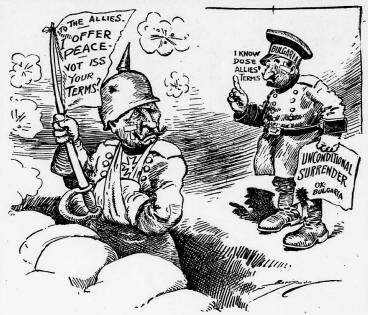 Newspapers now freely discuss grim tidings from the western front, secret from the German people for the past two months, and a wave of what closely resembles hysteria is reported to be sweeping over the country.
Newspapers now freely discuss grim tidings from the western front, secret from the German people for the past two months, and a wave of what closely resembles hysteria is reported to be sweeping over the country.
It is but a question of time, and probably a very short time, that after the exit from the scene of battle off Bulgaria, when Turkey must follow suit and when Austria-Hungary and Germany will be confronted by an Allied front on the Danube.
It is likely that the Germans will soon encounter an uprising in Romania in sympathy with the Allies, and possible defection of the Ukraine looking also towards extending aid to the Allies. The outrages of the Brest-Litovsk Treaty, by which their liberties were bartered away, is more painfully evident every day to the
inhabitants of the Ukraine, it is declared. Once they perceive the possibility of aid from the Allies it is thought that they will seize the opportunity to throw off the German fetters.
From Verdun to the North Sea the Germans are facing the front of steel and fire put out by the Allies, which is steadily forcing them back eastward. For the present, at least, the moving front appears irresistible. It has crushed through the celebrated Hindenburg line of defenses in many places, so that it cannot be said there
is any longer a Hindenburg line except in sections.
The retrograde movement of the Germans is recognized as being far from voluntary, although the reports would seem to seek to give it this impression. They are going back because they are being pushed back. They are leaving behind them such supplies they cannot destroy and large numbers of great pieces of artillery, too
cumbersome to move rapidly.
Kaiser Playing His Last Card
It is supposed that Germany is about to make a new peace proposal disguised under the most attractive Democratic program. With a new name on the roster of the rulers of Germany, the Kaiser could point to them as a realization of his recently announced policy of popular rule, but, it is noted, however, nothing is said, and the
recent announcement of the relinquishment of power by the military party or making members of the Cabinet answerable for their conduct of affairs.
In diplomatic circles the belief still continues to prevail that Turkey will capitulate and leave the Central Powers. If that happens, it will be entirely in order to look for a weakening of Austria-Hungary's alliance with Germany. Bulgaria's defection has caused profound depression in Germany that sloshing off another ally
would be classified by the Germans as a disaster of first importance.
October 10
Advance On Western Front Continues
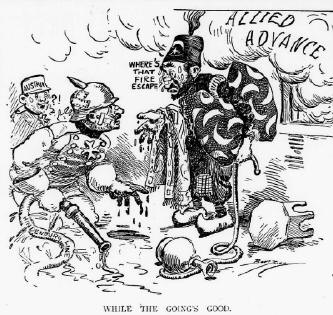 News from all battlefronts during the past week has continued to be excellent. Since last Saturday three distinct attacks have pushed the lines of the Allies forward to a considerably wider depth.
News from all battlefronts during the past week has continued to be excellent. Since last Saturday three distinct attacks have pushed the lines of the Allies forward to a considerably wider depth.
The Hindenburg line no longer bars the path of the Allies. Its definitive rupture was achieved on the first day of the fighting in the new development towards the north of the great battle now raging on the western front. Two Anglo-Saxon forces won the honor of storming the last remnants of the extraordinary maze of defenses,
in some places twelve miles in depth, between Cambrai and St. Quentin. Apart from this achievement, the result of the fighting was notable in that the enemy’s losses must have run into tens of thousands.
The Allies are now in open country on the Cambrai-St. Quentin front and are threatening Bohain, an important junction of roads and railways. Once the masters of Bohain, the Allies, should they push towards Guise, would have a clear path before them to the German frontier.
In the Argonne, the Americans have taken positions that threaten the enemy's most important artery of communication and are only eighteen miles away from the railway line, which, once captured, would cut off the German facilities for supplying their troops in the southern sector of the front. West of the Argonne forest, the
French, together with the second American division, have driven forward and now threaten the German railway communications in that area.
In the Champagne region, Americans advance on a 25-mile front. The American progress serves also as leverage on the right of the champagne offensive, resulting in advances further west, resulting in the further withdrawal of the German lines.
In Flanders, the Allies have pushed forward over the Hindenburg line and the evacuation by the Germans off the Belgian coast region is continuing. The telephone lines between the frontier and the coast were being taken down. The stores of materials at Knokke, near the coast, five miles from the Dutch border, have been set on
fire, and many factories have been mined in preparation for further quick destruction. More than 75 square miles of Belgian territory had been recaptured from the Germans by the operations in the past week.
As part of the occupation, troops would have to choose between capture and flight when the evacuation occurs, instructions have been given to them to escape to Holland in civilian clothes, with the object of avoiding imprisonment and subsequently returning to Germany.
Vigorously pressing the advantage gained by the breaking of the Germans between Cambrai and St. Quentin, the Allies have widened the great wedge in this area to such an extent that the entire German front from Rheims northward seems to be collapsing. The disintegration of this line is being hastened by the vigorous strokes
delivered by the French along the Aisne, while further east the German left flank in the active battle area is being hammered hard by other French forces and the American Army in the champagne, Oregon, and Verdun regions.
One million Germans are in full retreat between Cambrai and St. Quentin, with the Allies hot at their heels. At some points the advance of the Allies has exceeded fifteen miles in the past two days. This forward movement of the Allies is regarded as the first that in the great general retreat of the Germans, which now seems
inevitable, for it is doubtful whether Gen. Ludendorff has such fortified positions on the upper Oise and Sambre canal to permit him effectively to resist the victory of the last two days on the Allied side.
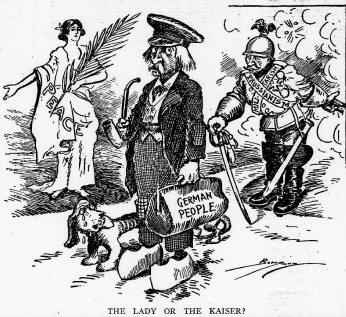 The four great battles that have been in progress since September 20, from Flanders to the Meuse, were increased to six by the entry into action of General Debeney’s men around St. Quentin and General Bertelot’s forces northwest of Rheims, and all
continue with great intensity.
The four great battles that have been in progress since September 20, from Flanders to the Meuse, were increased to six by the entry into action of General Debeney’s men around St. Quentin and General Bertelot’s forces northwest of Rheims, and all
continue with great intensity.
The endurance the Allies have shown in sustaining with undiminished furor the severe struggle over so extended a front against such formal works surprised the enemy. There are many indications that the Germans expected that exhaustion would have obliged the Allies to stop at the Hindenburg line. The Germans knew where they
were to be attacked, but they appear not to have rightly gauged the reserve forces the Allies were to throw into this fray.
Meanwhile, in the Balkans, the Serbians are in contact with the Austrians near Veranye. In Albania, the Austrians are retiring, followed by the Italians in close pursuit.
Surrender Probable If Allies Stand Firm
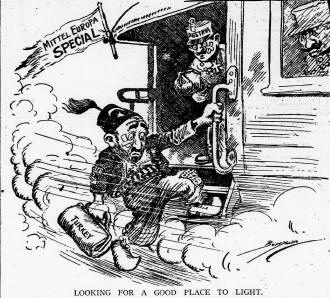 A powerful movement apparently is underway in Germany for a general armistice and peace. The new German Chancellor is reported to be in the process of proposing a general suspension of hostilities, and the appointment of ambassadors to meet at a
neutral place for the discussion of an armistice.
A powerful movement apparently is underway in Germany for a general armistice and peace. The new German Chancellor is reported to be in the process of proposing a general suspension of hostilities, and the appointment of ambassadors to meet at a
neutral place for the discussion of an armistice.
If the Allies and the United States stand absolutely firm for their program of justice and permanent peace, it is believed here that Germany will soon follow in the footsteps of Bulgaria and surrender unconditionally. There is practically no doubt that she will take this course rather than see the Allied Armies draw near her
frontiers. Her sins and crimes are so colossal that she has a deadly fear of vengeance, and anyone who has been with the Armies of the West knows that this fear is far from groundless.
Meanwhile, it is reported that the United States government would not accept any peace proposals from the present governments of Germany and Austria. Germany and Austria may announce until doomsday that they are in accordance with President Wilson's fourteen terms, but it is not words, but action that must guarantee such an
acceptance.
October 17
Germany Nearer Brink Of Disaster
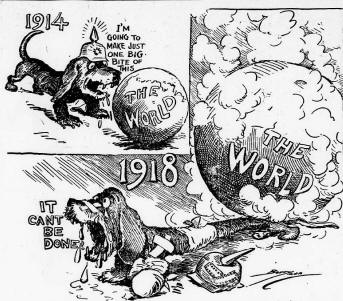 Field Marshall von Hindenburg has resigned as Chief of the German General staff after a heated interview with the Emperor, in which the Field Marshall declared that a retreat on a large scale was impossible to avoid. Gen. Ludendorff now is reaping
the results of the cardinal error he made in thinking that the Allied offensive was bound to be spaced at wide intervals, like his own. The continuity of the attacks has literally dumbfounded the Germans and it is plain that there is vacillation at the grand German headquarters.
Field Marshall von Hindenburg has resigned as Chief of the German General staff after a heated interview with the Emperor, in which the Field Marshall declared that a retreat on a large scale was impossible to avoid. Gen. Ludendorff now is reaping
the results of the cardinal error he made in thinking that the Allied offensive was bound to be spaced at wide intervals, like his own. The continuity of the attacks has literally dumbfounded the Germans and it is plain that there is vacillation at the grand German headquarters.
For instance, the evacuation of the Belgian coast appears to have been ordered and then countermanded, which justifies the inference that Gen. Ludendorff is no longer guided by purely military considerations, either from fear of the demoralization effect a large-scale retreat would have in the interior, or the idea that the
more territory that remains in his hands the stronger Germany’s position will be in its conversations with Washington.
There is evidence that the Germans are preparing to make a strong stand on the Valenciennes line, which now has been reached, at least east of the river Solie, by the Anglo-American forces.
The Germans have to do quick work in the preparations of the Valenciennes line, as it had not been finished for them by the time they were forced to move back to it. This line, which it appears that the Germans intended to hold seems in a general way, according to the best evidence, to run on high ground, east of the river
Esciallon. It is obvious that this is only a temporary line. It is known that the military officers that were formally on the Hindenburg line were moved to this line and guns had been seen moving there.
The resistance of the enemy in the whole area has stiffened appreciably this morning; the Germans put down a thin but determined barrage over the entire region. German resistance and artillery fire increased today all along the front. Nevertheless, the advance of the Allied troops continued here as well as to the south.
Notwithstanding the Germans having adopted a defensive line, the attacks by the British and Americans are continuing. It appears that, at the best, this line can only be used by the enemy as a temporary stopping place.
American and British troops captured what was probably the largest enemy ammunition dump ever taken. The shells, piled high, covered a large area. This capture will greatly reduce the quantity of ammunition available to the Germans on this section of the front. Prisoners captured said that they had been ordered to hold on to
the last and kill as many Britons and Americans as possible.
It is expected the German resistance will continue and will grow more determined until the first phase of the withdrawal in the Doual sector is completed.
British, Belgian and French forces attacked at dawn on Monday morning on a wide front in Flanders. By the fury with which the attack was launched it is evident that the fighting Armies are not paying the slightest attention to the peace talks. They smashed forward with all those characterized in recent operations. In response,
the retreating Germans are blowing up the locks and bridges on canals in Holland.
With the exception of the area north of Dousi, there appears to have been a slowing down of the Allied advance during the past couple of days. At no point have the British and Americans swept ahead as they did on Thursday and Friday of last week. This may indicate that the Germans have reached what is known as the Hunding
line. This position, while much less formidable, so far as known, then the Hindenburg system is still strong enough to retard the pursuit of the Allies and perhaps hold them up for some time.
Rumors Ripe About Kaiser Abdication
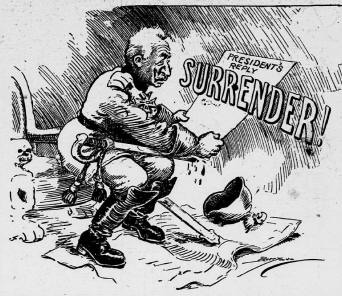 "The war is coming to an end and in such a matter as no man in Germany desires, said the Berlin Times on Monday. "Let us say it candidly," the newspaper continues, "all these terrible four years the aim of our efforts and sacrifice were to prevent such an
end." Many papers are indicating that Germany's unconditional surrender is coming.
"The war is coming to an end and in such a matter as no man in Germany desires, said the Berlin Times on Monday. "Let us say it candidly," the newspaper continues, "all these terrible four years the aim of our efforts and sacrifice were to prevent such an
end." Many papers are indicating that Germany's unconditional surrender is coming.
Some observers believe the Germans will make any sacrifice rather than go through another winter of war with the Allied Armies at or within their borders, and that the next move in Berlin may come more quickly than is generally expected. The German Army high command believes that the continuation of the war in the present
circumstances will bring no good results.
Some German newspapers take it for granted that Emperor William will abdicate. The Express says that for some time he has been sending his valuables to Holland. Some editorials expressed the view that the disappearance of the Emperor is immaterial.
Semiofficial information has reached England indicating a desperate political position in Germany. This is even more serious than the military situation and is responsible for the coming debacle. A great civil war is beginning. The Socialists of Germany, fearing that anarchy is about to set in, and desiring to save the country
from Russia's experience with the Bolsheviks, have prepared a scheme of government to take the reins if and when the Kaiser abdicates, in order that it may exercise any immediate steadying influence.
Oct 24
Austria Grants Autonomy
The Austrian Emperor has put in motion steps for the organization of Austria on a federal basis. In a statement the Emperor said; "since I have ascended the throne, I have tried to make it my duty to ensure to all my people the peace so ardently desired and to point the way to a prosperous development of intellectual and
economic prosperity."
"The parable struggles in the world war so far have made the work of peace impossible. The heavy sacrifices of the war should assure to ask an honorable peace, on the threshold of which, by the help of God, we are today."
"We must, therefore, undertake without delay the reorganization of our country on a natural, and, therefore, solid basis, such a question demands the desire of the Austrian people for harmonization and regionalization."
"I am dedicated to accomplishing this work with the free collaboration of my people. Austria must come in conformity with the will of its people, a Confederate state in which each nationality should form on the territory which it occupies its own local economy."
Allies Reached Dutch Frontier
Allied forces have captured the whole of the Belgian coast. Many German columns, numerous guns, and automobiles are reported traveling eastward towards the Holland frontier.
Unofficial reports state that the Belgian coast has been cleared completely of the enemy and that 6,000 German troops have been caught between the advancing Allies, the Dutch border and the North Sea. This force apparently was unable to make good his escape southeastward in the direction of Antwerp, owing to the rapidity of
the Allied advance. The allied troops in Flanders have regained 800 square miles of territory in the past four days.
Allied forces are pressing rapidly after the retiring enemy. Zeebrugge, the second and last of the submarine bases on the Belgian coast, was reportedly occupied by the British forces on Monday.
The German retirement in Belgium and northern France is going according to plan and the general movement of the enemy has settled down to a sort of panoramic procession. Whenever fighting takes place the result is Allied pressure on the retreating enemy, who is getting out as fast as he can, while the Allies continue to exact
their toll from the Germans in their hurried flight.
Refugees arriving in Holland from Belgium report that a number of ships carrying German officers and war material were shot to pieces by Belgian troops. The German troops, according to the refugees, are retreating towards Ghent and Antwerp. The evacuation of Brussels by the Germans has already begun.
Allied troops on the front of more than 120 miles from the North Sea to the Oise River are pressing closely after the retiring Germans. The enemy is being given no rest and may have difficulty in holding his supposedly prepared lines when they are reached.
On the north the British, French and Belgians are approaching Ghent, in the center the British are marching on Tournai, while the British, French and Americans north of Oise are threatening the important railway lines south of Valenciennes. In the Argonne, the Americans have improved their positions.
Hungary Declared As Independent State
Emperor Charles issued a manifesto to the Hungarian people announcing the independence of Hungary. Hungary, the manifesto said, is to have economic independence and will maintain her own Army and her own diplomatic corps.
Meanwhile, it is reported that Hungary intends to ask Allied governments for terms for an armistice. Austria-Hungary is already reconciled to the idea of unconditional capitulation, says a Vienna newspaper; because Vienna is threatened with famine, penny authorities are powerless and laws are no longer enforced.
The German-Austrian deputies in the Austrian reichsrath have formed an assembly for the purposes of conducting the affairs of the Germanic people in Austria, issuing a declaration announcing the creation of the German state of Austria.
The German state of Austria will seek access to the Adriatic Sea, in agreement with other nations. Pending the establishment of a constitution, according to this program, the people may be represented by deputies and constituted as a provisional national assembly. This body will represent the Germans in Austria in negotiations
for peace, and will exercise legislative powers.
For some time, the German people in Austria, distrusting the wavering policy of the Austrian-Hungarian Empire and fearing its dissolution or its withdrawal from Germany, were desirous of ensuring their own close unity with the German Empire. The German population in Austria forms the center of Austrian society and is the
largest of the many ethnic elements in the kingdom.
Meanwhile, a great demonstration in favor of an independent Hungary occurred in Bucharest on Friday. Thousands of people assembled outside the parliament building and demonstrated in favor of peace. There is no official information here to confirm any of the various interesting rumors coming out of Europe’s neutral countries
regarding development in Austria-Hungary. Austrian newspapers were publishing announcements that Austria was demobilizing its Army and that Emperor Charles was leaving the country as a first step in abdication.
The conclusion of a separate peace between the Allies and the different nationalities in the Austrian-Hungarian empire is now only a question of time. The Austrian War Minister, speaking at the Army Council, declared that the acceptance of Pres. Wilson's 14 points has proved Austria's readiness to reconstruct the monarchy in a
spirit of conciliation and true democracy. He urgently appealed to the delegates to assist the Army administration and the demobilization of the Army.
Disintegration Of German Autocracy
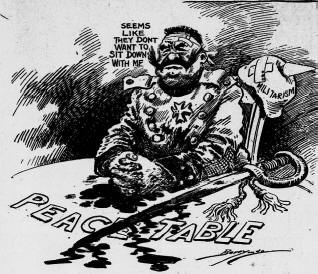 President Wilson is convinced that the disintegration of the German autocratic government has in fact set in and will proceed with rapid stages to a finale, which will hasten the capitulation of the Central Powers under the continued pressure of the military
forces of the Allies.
President Wilson is convinced that the disintegration of the German autocratic government has in fact set in and will proceed with rapid stages to a finale, which will hasten the capitulation of the Central Powers under the continued pressure of the military
forces of the Allies.
The president has counted heavily upon the crumbling of the military rule in Germany as the prerequisite of victory for the Allies and appeasement which will measure up to the demands of the nations opposed to the Central Powers.
The broad fact appears to be, it is said, that the German leaders admit defeat. Heretofore they have breathed consistently a spirit of defiance, to all the powers of earth, and have encouraged their people to stand fast until victory should be achieved. It would now appear to be their conclusion that victory has been arrested
from them, and they are beating about for an avenue of escape like a rat in a quarter.
Every move which President Wilson has made up to this time, says the Germans, first giving evidence of a weakening spirit, have been directed to hasten what has been foreseen as the inevitable. Up until now, it has not been possible for the Kaiser to rally the empire about the military party with a cry that all efforts at
peace have failed and that the nation must rally upon the sword and die in a last-ditch effort, defending the Fatherland, under his guidance and its continued control of the autocrats.
Oct 31
Hurry Armistice, Central Powers Cry
 "Hurry up with this armistice," is the cry of Turkey, Austria-Hungary and Germany, according to all the latest notes now in hand. The text of the American note has been cabled and today came an outline of Turkey's reported appeal for an independent
peace.
"Hurry up with this armistice," is the cry of Turkey, Austria-Hungary and Germany, according to all the latest notes now in hand. The text of the American note has been cabled and today came an outline of Turkey's reported appeal for an independent
peace.
The two northern nations are prolific and promises of reform along the lines were laid down by Pres. Wilson. Turkey's promises were not set forth in detail; Turkey wants peace, however, and wants it regardless of whatever obligations are laid upon her Allies.
Austrian-Hungarians’ profession of willingness to adopt changes which strike at the very keystone of the dual empire's construction, and Germany's malicious shedding of leopard spots almost overnight and frantic assurance of coming democratization, all bear witness to this seemingly imperative demand of the two neighboring
belligerents for an immediate cessation of hostilities.
In military circles this is construed to be incited by Germany's necessity of an armistice in order to enable her to move her Armies, guns and munitions back from the territory where they are now threatened by the Allied advance to positions of better security behind last lines of defense.
It is thought that the Germans are willing to promise anything to achieve this objective, and this accounts for the compliance with what they are regarding Austria-Hungary's defections from the alliance. The one big object of the German high command is believed now to be to save their Armies from further harm and plant them on
German territory, where they can be resuscitated and reinforced for subsequent engagements.
The supreme Allied War Council, now meeting in Versailles, is well aware of these considerations, and there is no fear among military men here that any of the peace offensives of the Germans will prevail to enable them to accomplish the desired objective. So the German, Austrian and Turkish government proposals of peace are
received in official circles here with equanimity.
Though the Austrian note goes further than any of the German peace proposals and it asked the president to begin immediate negotiations for peace and armistice without waiting further exchange with Germany, many officials all actively show no signs of the expected break in the alliance of the Central Powers.
Allies Issue Armistice Terms; Turkey Surrenders
In response to Germany and Austria's request for an armistice, the Allies have issued the following terms:
- Internationalization of the Bosporus and the Dardanelles.
- The surrender of Austrian warships.
- The right to use Austria-Hungary and their lines.
- The evacuation of Alsace Lorraine and territories that were wrongly occupied in the East and the West.
- The surrender of arms, common munitions and submarines.
- The occupation of fortresses and bridges along the Rhine, Luxembourg and Essen.
- The occupation of Kiel and Hamburg.
- The removal of mines from territorial warders.
- The delivery, as a preliminary compensation for damages, of a part of the enemy's merchant earnings.
- The cessation of manufacturing of war purposes.
Turkey immediately accepted the Allies’ terms and an armistice between the Allies in Turkey was signed, officially ending Turkeys participation in the war.
Germans Discuss Abdication
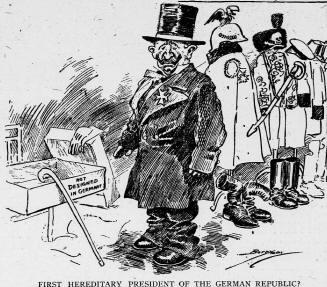 German newspapers are discussing openly whether the abdication of Kaiser William is necessary to obtain peace for Germany. Public anxiety over the solvency of the empire apparently is becoming acute in Germany.
German newspapers are discussing openly whether the abdication of Kaiser William is necessary to obtain peace for Germany. Public anxiety over the solvency of the empire apparently is becoming acute in Germany.
It is asserted that the arbitrary power of the Kaiser has been destroyed beyond the possibility of repair. It is also maintained that the changes in the constitution will deal with the suppression of the Emperor's absolute right to declare war, though in the government proposal it is said that the Kaiser can declare war
single-handedly in case Germany is attacked.
Now the people of Germany are asking what the Kaiser's position will be after the war when reform has passed over the country. It is said that the Emperor is deeply worried over the prospect of becoming, as he says, a mere figurehead. Nobody in Germany cares what the Kaiser thinks about.
It is not supposed that the Henzollern dynasty can remain in power long after the royal powers have been curtailed. There is even much discussion as to the next sovereign. One thing is sure - the Kaiser is no longer master of Germany. Parliament, which remains united, will sooner or later place before him the choice; accept
the new order of things, or go.
Read past editions of News Reports From the Front
Have a newspaper clipping on a event that took place in Emmitsburg?
If so, send it to us at history@emmitsburg.net